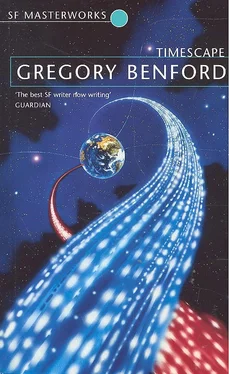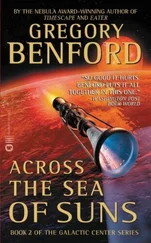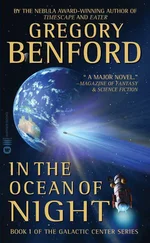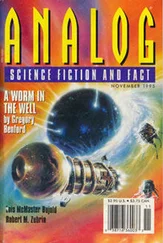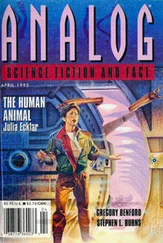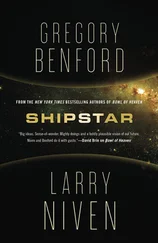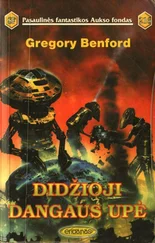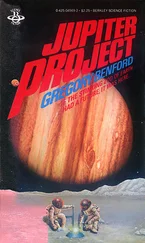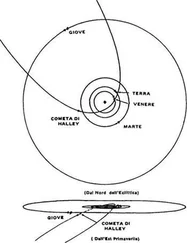Renfrew came stamping back to the central oscilloscope and glanced at the dancing jumble of noise. “Damn!” he said vehemently. “Bloody stuff won’t go away.”
Peterson volunteered, “Well, it’s not absolutely necessary for you to send the new signals while I watch. I simply stopped by to check up on matters.”
“No, no,” Renfrew shifted his shoulders awkwardly under his brown jacket. Markham noted the jacket pockets were crammed with electronics parts, apparently stuck there and forgotten. “I got a good run yesterday. No reason why I shouldn’t today. I transmitted that astronomical part steadily for three hours.”
“I must say I don’t see the necessity for that,” Peterson said, “considering the difficulty in sending the truly important—”
“It’s to help anyone receiving on the other end,” Markham said, stepping forward. He made his face resolutely neutral, though in fact he was rather distantly amused by the way the two other men seemed to immediately hit upon an area of disagreement, as though drawn to it. “John here thinks it might help them to know when our beam will be easiest to detect. The astronomical coordinates—”
“I fully understand,” Peterson cut him off. “What I don’t understand is why you don’t devote your quiet periods to the essential material.”
“Such as?” Markham asked quickly.
“Tell them what we’re doing, and repeat the ocean material, and—”
“We’ve done all that to death,” Renfrew blurted. “But if they can’t receive it, what bloody—”
“Look, look,” Markham said mildly, “there’s time enough to do it all, right? Agreed? When the noise goes down, the first priority should be sending that bank message of yours, and then John here can—”
“You didn’t send it right away?” Peterson cried with surprise.
Renfrew said, “Ah, no, I hadn’t finished the other material and—”
“Well!” Peterson seemed excited by this; he stood up quickly and paced energetically in the small space before the towering gray cabinets. “I told you about finding the note—quite surprising, I must admit.”
“Yes,” Markham admitted. There had been considerable agitation when Peterson appeared this morning, bearing the yellow paper. Suddenly the entire thing had seemed real to them all.
“Well,” Peterson went on, “I was thinking about your trying to, ah, extend the experiment.”
“Extend?” Renfrew asked.
“Yes. Don’t send my message.”
“Good grief,” was all Markham could say.
“But, but don’t you see that…” Renfrew’s voice trailed off.
“I thought it would be an interesting experiment.”
Markham said, “Sure. Very interesting. But it will set up a paradox.”
“That was my idea,” Peterson said swiftly.
“But a paradox is what we don’t want,” Renfrew said. “It’ll bugger the whole idea.”
“I explained that to you,” Markham said to Peterson. “The switch being hung up between on and off, remember?”
“Yes, I understand that perfectly well, but—”
“Then don’t suggest rubbish!” Renfrew cried. “If you want to reach the past and know you have done it, then leave hands off.”
Peterson said with glacial calm, “The only reason you do know is that I went to the bank in La Jolla. The way I see the matter is that I have confirmed your success.”
There was an awkward silence. “Ah… yes,” Markham put in to fill the pause. He had to admit Peterson was right. It was precisely the kind of simple check he or Renfrew should have tried. But they were schooled in thinking of mechanical experiments, full of devices which operated without human intervention. The notion of asking for a confirming sign simply had not occurred to them. And now Peterson, the know-nothing administrator, had proved the whole scheme was right, and he had done it without any sophisticated thinking at all.
Markham took a deep breath. It was heady, realizing that you were doing something never accomplished before, something beyond your own understanding, but undeniably real. It had often been said that science at times put you into a kind of contact with the world that nothing else could. This morning, and Peterson’s single sheet, had done that, but in a strangely different way. The triumph of an experiment was when you reached a fresh plateau of knowledge. With tachyons, though, they had no true understanding. There was only the simple note on a scrap of yellow.
“Ian, I know how you feel It would be damned interesting to omit your message. But no one knows what that would mean. It might prevent us from doing what you want—namely convey the ocean information.”
Renfrew underlined these sentiments with a “Damned right!” and turned back to the apparatus.
Peterson’s eyelids lowered, as though he was deep in thought. “A good point. You know, for a moment there I thought there could be some way of finding out more that way.”
“We could,” Markham agreed. “But unless we do only what we understand…”
“Right,” Peterson said. “We rule out paradoxes, agreed. But later…” He had a wistful look.
“Later, sure,” Markham murmured. It was odd, he thought, how the players had reversed roles here. Peterson was supposedly the can-do administrator, pressing for results above all else. Yet now Peterson wanted to push the parameters of the experiment and find out some new physics.
And opposing this were Renfrew and himself, suddenly uncertain of what a paradox might produce. Ironies abounded.
• • •
An hour later the fine points of logic had faded, as they so often did, before the gritty details of the experiment itself. Noise smeared the flat face of the oscilloscope. Despite earnest work from the technicians the jitter in the experiment would not diminish. Unless it did, the tachyon beam would be uselessly diffuse and weak.
“Y’know,” Markham murmured, leaning back in his wooden lab chair, “I think your Caltech stuff may bear on this, Ian.”
Peterson looked up from reading the file with a red CONFIDENTIAL stamped across it. During the lulls he had been steadily working his way through a briefcase of paperwork. “Oh? How?”
“Those cosmological calculations—good work. Brilliant, in fact. Clustered universes. Now, suppose someone inside them is sending out tachyon signals. The tachyons can burrow right out of those smaller universes. All the tachyons have to do is pass through the event horizon of the closed-off microgeometry. Then they’re free. They escape from the gravitational singularities and we can pick them up.”
Peterson frowned. “These… microuniverses… are other other places to live? They might be inhabited?”
Markham grinned. “Sure.” He had the serene confidence of a man who has worked through the mathematics and seen the solutions. There was a blithe certainty that came from first comprehending the full Einstein field equations, arabesques of Greek letters clinging tenuously to the page, a gossamer web. They seemed insubstantial when you first saw them, a string of squiggles. Yet to follow the delicate tensors as they contracted, as the superscripts paired with subscripts, collapsing mathematically into concrete classical entities—potential; mass; forces vectoring in a curved geometry—that was a sublime experience. The iron fist of the real, inside the velvet glove of airy mathematics. Markham saw in Peterson’s face the hesitant puzzlement that swam over people when they struggled to visualize ideas beyond the comforting three dimensions and Euclidean certainties which framed their world. Behind the equations were immensities of space and dust, dead but furious matter bending to the geometric will of gravity, stars like match heads exploding in a vast night, orange sparks that lit only a thin ring of child planets. The mathematics was what made it all; the pictures men carried inside their heads were useful but clumsy, cartoons of a world that was as subtle as silk, infinitely smooth and varied. After you had seen that, really seen it, the fact that worlds could exist within worlds, that universes could thrive within our own, was not so huge a riddle. The mathematics buoyed you.
Читать дальше
